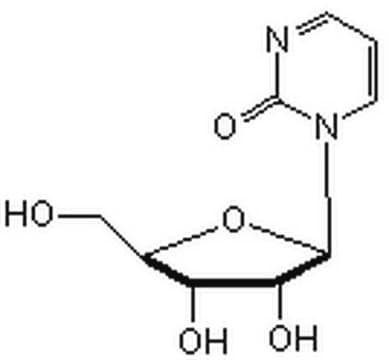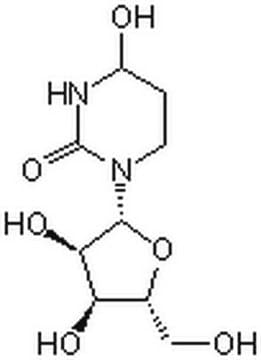Z4775
Zebularine
≥98% (HPLC), solid
Sinónimos:
1-(β-D-Ribofuranosyl)-1,2-dihydropyrimidin-2-one, 2-Pyrimidone-1-β-D-riboside
About This Item
Productos recomendados
Quality Level
assay
≥98% (HPLC)
form
solid
solubility
DMSO: 16 mg/mL
storage temp.
2-8°C
SMILES string
OC[C@H]1O[C@H]([C@H](O)[C@@H]1O)N2C=CC=NC2=O
InChI
1S/C9H12N2O5/c12-4-5-6(13)7(14)8(16-5)11-3-1-2-10-9(11)15/h1-3,5-8,12-14H,4H2/t5-,6-,7-,8-/m1/s1
InChI key
RPQZTTQVRYEKCR-WCTZXXKLSA-N
Biochem/physiol Actions
Features and Benefits
Storage Class
11 - Combustible Solids
wgk_germany
WGK 3
flash_point_f
Not applicable
flash_point_c
Not applicable
ppe
Eyeshields, Gloves, type N95 (US)
Certificados de análisis (COA)
Busque Certificados de análisis (COA) introduciendo el número de lote del producto. Los números de lote se encuentran en la etiqueta del producto después de las palabras «Lot» o «Batch»
¿Ya tiene este producto?
Encuentre la documentación para los productos que ha comprado recientemente en la Biblioteca de documentos.
Los clientes también vieron
Artículos
Cancer research has revealed that the classical model of carcinogenesis, a three step process consisting of initiation, promotion, and progression, is not complete.
We offer a variety of small molecule research tools, such as transcription factor modulators, inhibitors of chromatin modifying enzymes, and agonists/antagonists for target identification and validation in gene regulation research; a selection of these research tools is shown below.
We offer a variety of small molecule research tools, such as transcription factor modulators, inhibitors of chromatin modifying enzymes, and agonists/antagonists for target identification and validation in gene regulation research; a selection of these research tools is shown below.
We offer a variety of small molecule research tools, such as transcription factor modulators, inhibitors of chromatin modifying enzymes, and agonists/antagonists for target identification and validation in gene regulation research; a selection of these research tools is shown below.
Nuestro equipo de científicos tiene experiencia en todas las áreas de investigación: Ciencias de la vida, Ciencia de los materiales, Síntesis química, Cromatografía, Analítica y muchas otras.
Póngase en contacto con el Servicio técnico










